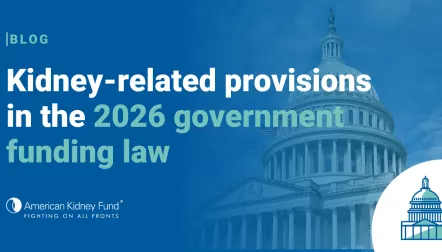
Blog post
AKF urges USPSTF to consider kidney disease screening

In late August, the American Kidney Fund (AKF) wrote to the U.S. Preventive Services Task Force (USPSTF) urging them to develop a kidney disease screening recommendation. You can read the full version of our letter here.
Our support for a kidney disease screening recommendation stems from concerns about the growing number of people who experience kidney failure and need dialysis or transplantation, the health disparities associated with kidney disease and the need for a clinical assessment tool for physician use by primary care physicians and other providers when screening for chronic kidney disease. The last time the USPSTF considered kidney screening guidelines was 2012 and much has changed since then. For example, there are at least two classes of drugs today that help slow the progression of kidney disease that did not exist in 2012 (SGLT2 inhibitors and GLP-1 receptor agonists).
Thirty-seven million people in the United States have kidney disease, and most do not know that they have it. More than 809,000 people in the United States, or about 1 in 500 people, are currently living with kidney failure. Unfortunately, the numbers are growing. From 2009-2019, the number of people with kidney failure increased by more than 41%. In 2009, there were 574,000 people with kidney failure. In 2019, that number increased to 809,103. Studies project that 971,000 to 1,259,000 individuals will be living with kidney failure in 2030.
As many of our AKF Ambassadors know, kidney failure radically changes a person's life and lifestyle, including an inability to work for most people because of their need for ongoing dialysis treatments. If people can find out about their kidney disease in its early stages, they have the opportunity to make lifestyle changes that can slow or halt the progression of the disease and possibly prevent kidney failure. Seventy-five percent of new kidney failure cases are due to diabetes and hypertension (high blood pressure), largely modifiable risk factors.
In our letter, we asked the USPSTF to recommend that screenings for kidney disease be done for every person known to be at higher risk for kidney disease, specifically for people who have been diagnosed with high blood pressure, diabetes or heart disease.
Because health disparities also play a huge role in the progression of kidney disease, we also suggested that a recommendation from the USPSTF include all racial and ethnic minorities in kidney disease screenings with a better focus on screenings for communities of color, who are more likely to suffer kidney failure. Additionally, we suggest the USPSTF include a recommendation that all people who utilize community health centers or federally qualified health centers (FQHCs) should be screened when they visit on an annual basis.
As part of our Unknown Causes of Kidney Disease (UCKD) project, AKF recently completed a survey of 300 clinicians in primary care, nephrology and endocrinology that showed some concerning trends for kidney disease testing and late referrals. The survey found that urinalysis, an important test used to detect the earliest stages of kidney disease, isn't used as frequently as blood tests, which tend to catch kidney disease in later stages. Also, according to the survey, nearly half of patients were not referred to a nephrologist until they had reached stages 4 or 5 of kidney disease. These late referrals were attributed to a variety of reasons including difficulty accessing nephrology care in rural areas, lack of early detection and confusion about what next steps a patient should take. Furthermore, primary care providers were confused about who they should refer their patients to.
Our letter stated that a recommendation from the USPSTF to screen high-risk populations for both urine albumin to creatinine ratio (ACR) and eGFR would help guide primary care providers on who should be screened and what to do if someone is diagnosed with kidney disease. This would ultimately support early detection prior to near end-stage disease and afford a better opportunity to slow or stop the worsening of the disease which leads to kidney failure. We also support a recommendation that primary care providers refer a patient to a nephrologist when they reach stage 4 kidney disease or severely increased albuminuria (protein in the urine).
It is AKF's hope that the USPSTF will take action on the kidney disease screening recommendations this year.





